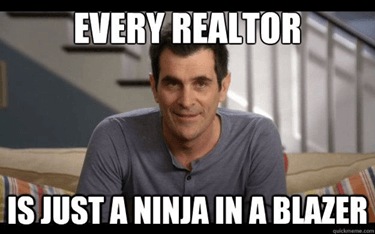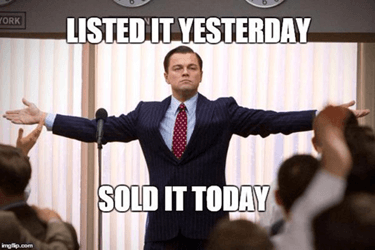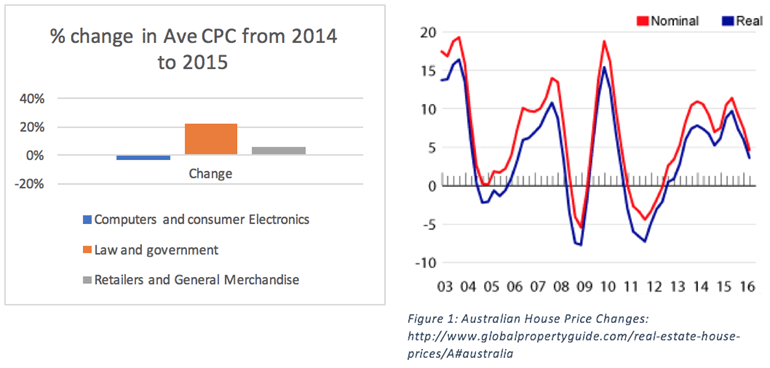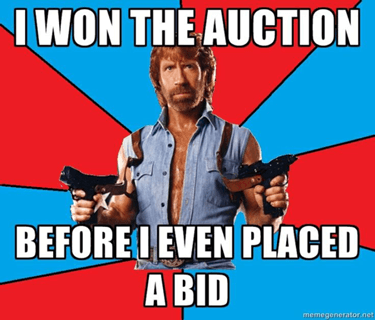August 17, 2017
There are many surprising similarities between AdWords auctions and real estate markets. What can one ancient industry teach us about one that is so new to us? By comparing the two we’ll try and understand more about CPC inflation, effective investment strategies and where the industry could be heading.

AdWords auctions are like real estate auctions in many ways. A savvy AdWords practitioner will always begin with keyword & market research. Understanding CPC’s and suggested minimum bids is crucial. Real estate is the same, talking to agents and researching historical values is essential for speculating and setting reserves. Bidding in both markets occur rapidly in real time.
There are some differences though. In AdWords, competitor bids are not openly revealed, (but they can be revealed through bid adjustments). Also, in a real estate auction, money is the only variable, while in AdWords both bids and ‘Quality Score’ play into the auction. Even so, bids are responsible for the final outcome and are controlled by the advertiser. In a real estate auction the goal of the seller is to drive up prices. So too the goal of an AdWords auction is to give the highest bidder the best result.

The inevitable outcome is that over time CPC’s will inflate. Although Google reports that CPC’s are decreasing, what advertisers are seeing in the wild is different. Search Engine Land explains that Google is presenting aggregated data. This includes data from YouTube. Most advertisers actually report increasing CPC’s. AdGooroo reports 40% increases between 2012 and 2014. Other advertisers see it as high as 50%. A more conservative assumption puts it at 12%. Most 3rd party advertisers I’ve come across using the platform report that CPCs are rising. This inflation rate appears to be higher than a natural inflation rate which is usually around 2 to 3%.
As an example, the data below shows changes in CPC’s for 3 industries in Australia. This data has been provided by Google for the AU market. The graph shows % changes from 2014 to 2015. Although computers and electronics saw a decrease -3%, overall, these 3 industries together had a 6% increase in CPC’s year on Year. The second graph shows changes in Australian house prices over the years. During the same period we see changes between 5% to 8% in house price growth.

These are boom years within the Australian housing markets and yet they are still experiencing similar growth rates to AdWords CPC’s.
Why is AdWords CPC growth so high?
Are CPC’s overvalued?
Victoria Olsina proposes that AdWords exhibits similar features to economies with historical inflation. She notes 3 issues:
- Increased demand from competitors
- Increased money supply – in the form of Google handing out free credit ($75 and $100 coupons). This would devalue the money that people are using.
- Driving up CPC’s with increased default bids.
Points 1 & 3 are valid, but point 2 is not a significant factor.
Point 3 is the most interesting. As a real estate market gains momentum, we see more sales going to auction. Auctions are preferred by sellers because they have all the ingredients to maximise the sale price and the seller can always fall back on their reserve. This system lets Google recommend their own reserve prices (minimum bids). You won’t get many impressions and clicks to your ads if you bid below the recommended bid.
It’s more concerning that Google is the key instigator in many of these auctions. They often advertise their own products which causes advertisers to indirectly drive up bids. A recent article on the Wall Street Journal reveals details on how Google’s own ads on the platform are driving up competitor bids even further. Google claims their ads don’t affect competitor bids but it’s seen that when competitor’s loose auction’s they are motivated to increase bids to regain advertising positions. Marketers told the WSJ “Advertising slots on many pages are limited, so Google’s ads can prompt others to increase their bids to compete with the remaining slots.”
The AdWords Auction environment is designed to promote competition and increased bids between competitors. Furthermore, Google is acting within the auction, advertising their own products which drives prices even higher!
Are we heading for a CPC Bubble?
Today in many parts of the world we have a situation where real estate prices are astronomical. Where I live in Sydney the market has been declared the second most unaffordable in the world. It is largely an effect of supply and demand. When demand outweighs supply, real estate becomes overvalued and we get into bubble territory.
We’re moving towards this with AdWords as well. Supply is decreasing. In February 2016 Google made a substantial change, removing all right hand side ads. This means that above the fold on the SERP, there are now 4 ads instead of the previous 11 (8 on the side, 3 in the main section). It also means that a maximum of only 7 ads are displayed on page 1, down from around 14 ads. Another recent change by Google is the roll-out of ‘Expanded Text Ads’ (ETA’s). ETA’s have more text characters within them then Standard Text Ads. ETA’s are now the norm in AdWords. This will mean that bigger ads will further decrease the number of ads displayed above the fold on the SERP.

While supply decreases and demand increases, there will only be one outcome. Since Google controls the supply the only factor that can influence CPC’s is to change demand. In a real estate market, other factors like rising interest rates from lenders can turn real estate assets into liabilities when repayments become un-serviceable. Owners are forced to sell (demand decreases) which leads to more supply. The same can happen in the CPC space. Once CPC’s reach a point where they are overvalued, the return per click will be un-serviceable and lenders (shareholders) will be less willing to provide capital. Advertisers will leave AdWords, supply increases and CPC’s come down.
Theoretically this should happen faster in an online auction platform, since there are no physical assets & agents to deal with. In AdWords, it happens at the click of a button. But it will depend on how quickly advertisers can determine they are ROI negative and whether they have alternate sources/platforms to turn to for their advertising.
But maybe it’s not a bubble and there is real long term value in rising CPC’s.
Historical figures show that property appreciates over the long term. Although Interest rates may rise and turn your property into a liability in the short term, there will be a significant capital gain in the long term. Thus, it can still valuable to hold onto.
Many AdWords and Social Media advertisers realise this and implement short & long term strategies. This can include investing in the long term for brand and short term for ROI. This means that even if ROI is negative, CPC’s may continue to rise and advertisers may continue to invest. This could create an even greater bubble effect.
Effective investment strategies & what else can you do to survive?

Robert Kuyosaki, a well-known real estate Guru proposes the exact opposite. His mantra states that “an asset is something that puts money in your pocket“. He proposes that even someone’s own home is a liability since it only takes money out of their pocket. Kuyosaki believes in only investing for positive cash flow in the short term. Kuyosaki searches for investments that have an immediate positive yield, these are often in undervalued suburbs near higher value areas. These assets are then built up over time to invest in higher value areas. This strategy translated to AdWords results in cutting out many of the head terms we are bidding on day-to-day that are likely to have too high CPC’s. Research is required to find longer tail, lower cost keywords that I would consider cash flow positive terms. This is like buying undervalued properties that generate lower revenue but are cash flow positive. This could also entail searching out profitable areas, times of day or other variables where CPC’s are lower.
Another key investment strategy in real estate and in finance is diversification. Putting all your eggs in one basket increases risk. For advertisers investing only in AdWords it’s important to realise that there is more supply out there. Think of other platforms like Bing & Facebook. Although they may be smaller platforms, by diversifying and adapting strategies to different neighbourhoods (audiences) value can be found.
What will Google do?
I’m sure that Google is acutely aware that if CPC’s rise to high, advertisers will begin to flee. They must be wondering where that point is. But as with all bubbles, it is impossible to know for sure. AdWords is Google’s main revenue driver and Google has its investors to answer to and rising returns look good. My prediction is that Google will begin to increase ad supply, but it will be at the expense of organic placements. This will allow Google to increase supply without effecting its bottom line. This year we will begin to see more and more posts with titles like this one: Is Google AdWords pushing SEO to page 2.